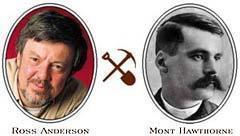
CARMACKS, Yukon Territory - Here in the North, Yukon gold takes many forms.
For some, it's the tourists - Canadian and American, Japanese and German - who flock here prepared to pay for a wilderness experience.
For others, it is a good government job to support their northern lifestyle.
For Ervin Cork, it is mushrooms.
"Corky," as he is known among Northwest mushroomers, travels God's Country in search of 'shrooms.
Not just any 'shrooms, and certainly not those tasteless wonders grown in hothouses and marketed in shrink-wrap.
Corky buys and sells only the best morels, matsutakes, boletes, pines and chanterelles that can be found in Northwest forests.
In a village like this one, where recent fires have devastated huge tracts of boreal forest, folks have come to expect Corky to show up in his blue, four-wheel-drive Blazer, towing the plywood trailer that announces "Corky's Shroom Shrinker."
When he does arrive, usually a year after a major forest fire, word spreads fast and folks take to the woods to find mushrooms and sell them to Corky for as much as $250 a pound.
He once paid $300 a pound for dried pines. But "that's because I was mad."
"He may not be the biggest buyer around, but he's the best known," says his wife, Barbara, who is accompanying Corky on this summer's expedition along with their teenaged daughter, Vanessa.
"I know, because the phone starts ringing about February 1."
Adds Vanessa: "I tell people, `My god, there's still snow on the ground.' "
Corky started out on the Canadian Prairies, working in the oilfields. He has the thick arms and hands to show for years of work in the Midwest cold. About 10 years ago, he hurt his back, moved to Salmon Arm, B.C., and switched professions.
"A friend was into pine mushrooms, and I figured that was something I could do without heavy lifting."
He built a portable dryer, which slowly sucks the moisture from the mushrooms. Once dried, he boxes them up and ships them to a Toronto distribution center. Then they go to the finest restaurants in New York, Paris, Geneva and Tokyo.
It's a solitary trade - even a hobby - says Corky. The entire world market is about 2,000 kilograms per year, he says.
All this begins with a good forest fire, which makes the Pacific Northwest, from Oregon to the Yukon, prime mushroom country.
"Last year's fires are always best," he says. "During the winter, you learn where the fires have been, and you try to figure out which ones will make the best mushrooms. It's always a gamble."
This summer, the Corks headed north for Carmacks. When we met them, they had just walked 27 miles into a major burn, picked 200 pounds of morels and summoned a helicopter to take them back out.
Other varieties, especially the prized pine mushrooms, or Armillaria ponderosa, grow in much older fire areas, where the pine regrowth is about 100 years old.
"Either way, it's fire that makes the difference," he says. "In Korea, they were burning whole forests just to get 'shrooms. They had to pass a law against that."
Corky and friends don't have to burn forests. Nature takes care of that. Fire is an ancient part of the forest cycle, and gourmet mushrooms are part of the natural succession by which they regenerate.
Corky, meanwhile, pursues a vintage Northwest lifestyle, hunting and gathering on vast public lands, paying the pickers, but not the owners. The public gains nothing, but loses nothing.
"They grow back, eh?" Corky observes. "Pick that morel today and it starts growing back within two or three days. Another mushroom in the making."
"It's not a big business, but it's a bit of a livin'. Fact is, it's a lot like panning for gold. You do it mostly because you want to be out here instead of sittin' home feeling sorry for yourself."
The Corks will be moving on now. They've done what they can do here, and the chanterelles should be ready out in Saskatchewan country, where word will get out that the Blue Blazer is in town.
As for us, we'll be returning to the river, heading for Dawson City, where word has it the 'shrooms are truly golden.